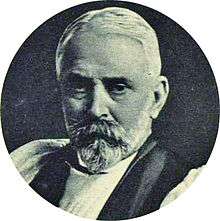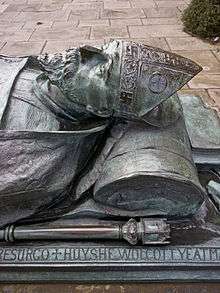Huyshe Yeatman-Biggs
| The Right Reverend Huyshe Wolcott Yeatman-Biggs | |
|---|---|
| Bishop of Coventry | |
 | |
| Diocese | Coventry |
| Installed | 1918 |
| Term ended | 1922 |
| Successor | Charles Lisle Carre |
| Other posts |
Bishop of Southwark (suffragan), in Rochester Bishop of Worcester |
| Orders | |
| Ordination | 1869 |
| Consecration | 1891 |
| Personal details | |
| Birth name | Huyshe Wolcott Yeatman |
| Born | 2 February 1845 |
| Died | 2 April 1922 (aged 77) |
| Buried | Old Coventry Cathedral |
| Nationality | British |
| Denomination | Church of England |
| Spouse | (1) Lady Barbara Legge; (2) Frances, dau. of 5th Viscount Barrington |
Huyshe Wolcott Yeatman-Biggs (2 February 1845 – 14 April 1922), until 1898 known as Huyshe Wolcott Yeatman, was an influential Church of England clergyman who served as the only Bishop of Southwark to be a suffragan bishop (in the Diocese of Rochester), the 105th Bishop of Worcester and, latterly, as the inaugural bishop of the restored see of Coventry in the modern era.
Yeatman was born at Manston House, Dorset, the younger son of Harry Farr Yeatman JP by his marriage to Emma, daughter and heiress of Harry Biggs, of Stockton House, Wiltshire. He was educated at Winchester College[1] and Emmanuel College, Cambridge, where he was a Dixie Scholar,[1] and eventually (1905) an Honorary Fellow.[2] He was ordained in 1869 and after a curacy in Salisbury became chaplain to the bishop in 1875. That same year he married firstly Lady Barbara Legge, daughter of the 4th Earl of Dartmouth.[3]
He was successively vicar of Netherbury and Sydenham before becoming Bishop of Southwark (a suffragan bishop in the Diocese of Rochester) in 1891, a post he was to hold for foyrteen years before appointment as Bishop of Worcester in 1905.[4] During his years there Yeatman-Biggs forged very close links with the Episcopal church in the United States.[5] In 1898, he inherited the estate of his brother, General Yeatman-Biggs CB, and assumed the additional name of Biggs by Royal licence.[1]
In 1918 he took on the task of reviving the Coventry diocese, during which time he came to national prominence when an unscrupulous adventurer accused him of influencing a vulnerable pensioner into leaving him her assets.[6] Not only were the charges completely unfounded, the much smaller sum he had received was quite properly re-distributed to worthy Anglican causes.
After Yeatman-Biggs's death, a bronze effigy of him was commissioned by Hamo Thornycroft,[7] and was the only artefact to survive more or less intact the bombing of Coventry Cathedral in 1940.[8]

Works
- The Efficiency and Inefficiency of a Diocese, London, SPCK, 1909
- Life in an English Diocese, London, SPCK, 1915[9]
References
- 1 2 3 "Who was Who" 1897–1990 London, A & C Black, 1991 ISBN 0-7136-3457-X
- ↑ "Yeatman (post Yeatman-Biggs), Huyshe Wolcott (YTMN864HW)". A Cambridge Alumni Database. University of Cambridge.
- ↑ Rt. Rev. Huyshe Wolcott Yeatman-Biggs. thePeerage.com. Retrieved on 26 November 2008.
- ↑ The Times, Wednesday, 14 December 1904; p. 9; Issue 37577; col E New Bishops.(of Worcester) Category: Official Appointments and Notices
- ↑ "American addresses" Yeatman-Biggs, H.W: London, Longmans,1916
- ↑ The Times, Thursday, 27 October 1921; p. 4; Issue 42862; col F Probate, Divorce, And Admiralty Division. Charges Of Undue Influence Against A Bishop Withdrawn., In The Estate Of Amy Mary Wheeley Lea, Deceased-Jacomb V. Biggs
- ↑ 'H. W. Yeatman-Biggs; 1st Bishop of Coventry'. Public Art Research Archive, Sheffield Hallam University. Retrieved on 26 November 2008.
- ↑ St Michael's - The Old Cathedral. Retrieved on 26 November 2008.
- ↑ Life in an English Diocese, being the second quinquennial visitation charge of Huyshe, Lord Bishop of Worcester
| Wikimedia Commons has media related to Bishop Huyshe Wolcott Yeatman-Biggs. |
| Church of England titles | ||
|---|---|---|
| New title | Bishop of Southwark 1891 – 1905 |
Succeeded by Edward Stuart Talbot |
| Preceded by Charles Gore |
Bishop of Worcester 1905 – 1918 |
Succeeded by Ernest Harold Pearce |
| New creation | Bishop of Coventry 1918 – 1922 |
Succeeded by Charles Lisle Carr |